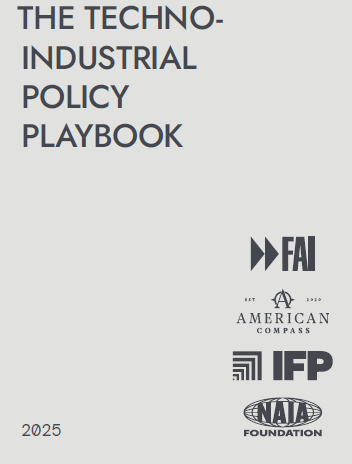The Techno-Industrial Policy Playbook Is Disguised Progressivism
Check out my latest article on X.com.
Hello Friends!
There's a growing movement on the right that says we need more government—more spending, more control, more planning—to beat China, restore manufacturing, and rebuild America. This is all laid out in the Techno-Industrial Policy Playbook from American Compass and other groups. But while the language may sound new, the ideas aren’t. They echo the same central planning failures we’ve fought for decades.
In this week’s feature article on X.com, I explain why this top-down “conservative” vision isn’t conservative at all—and how it threatens to replace free markets with bureaucratic mandates dressed in patriotic colors. I explain the real causes of the decline of the Rust Belt, why most Americans don’t want to work in factories again, and what freedom conservatives should be doing instead.
👉 Read the full piece below and join me in choosing Friedman over favoritism, Hayek over hubris, and liberty over leverage. It’s time to let people prosper—not planners.
The Techno-Industrial Policy Playbook Is Disguised Progressivism
Americans are watching grocery bills rise, rents rise, and paychecks barely keep pace. They hear promises from Washington—this time from the right—that new government investments and industrial planning will bring jobs back, rebuild the middle class, and revive American greatness. It sounds appealing. But be warned: these are recycled progressive ideas wrapped in new rhetoric. What’s being offered is not a solution—it’s a mirage.
The Techno-Industrial Policy Playbook, recently released by American Compass and others, calls for a new wave of federal involvement in the economy: new bureaucracies, new mandates, and billions in taxpayer subsidies for favored sectors like semiconductors and green energy. It promises to fix problems supposedly caused by free markets. But the reality is exactly the opposite. Capitalism didn’t fail us. Governments did.
Source: https://www.rebuilding.tech/playbook
This push for industrial policy assumes the Rust Belt was gutted because of trade and automation. But what really happened was a long pattern of failed decisions at every level of government. High taxes, overregulation, union mandates, zoning barriers, failing schools, and fiscal mismanagement made building or investing in many places too costly. Jobs didn’t vanish. They moved—mainly to the Sun Belt and sometimes overseas, where it was more profitable.
Middle-class Americans haven’t disappeared either. Many have moved up. Census data show the share of households earning above $100,000 has grown significantly over the past few decades. At the same time, those in the lowest income brackets have declined. This is upward mobility—something markets, not mandates, deliver.
What Americans are really feeling today is the result of inflationary policies, wasteful spending, and regulatory burdens that choke off opportunity. Doubling down on those same mistakes with centralized industrial planning will not help; it will worsen them. Look at the track record. Solyndra, the CHIPS Act, and bloated COVID relief fraud show what happens when the federal government tries to micromanage markets. The incentives are wrong. The waste is real. And the American people get stuck with the bill.
The Department of Government Efficiency (DOGE) has revealed just how bad it is. Over $233 million in DEI grants were canceled, including a $1 million program on “Antiracist Teacher Leadership.” The Department of Defense admitted to $80 million in wasteful spending. One government contract paid $181,000 for a climate advisor in Central Africa. More than 500,000 government credit cards were found active across 32 agencies. That’s not innovation. That’s government waste. The estimated savings so far are $165 billion, or more than $1,000 saved per taxpayer. Much less than the $2 trillion proposed by Elon Musk, but a start that Congress should build on.
And yet, the American Compass plan would add even more federal coordination. They propose a new National Investment Council, a Chief Investment Officer answering to the President, and legal frameworks to steer capital into politically approved sectors. What’s their assumption? That Washington knows better than you where your job should come from, what industries matter, and how to spend your tax dollars.
But no bureaucracy can outthink the millions of daily decisions individuals, businesses, and families make nationwide. Real prosperity doesn’t come from centralized planning—it comes from people freely trading, building, and adapting. The innovation that drives better lives doesn’t originate in Washington. It starts in the garage, the startup, the small business. All of that gets crowded out when the government starts steering the ship.
The alternative is clear and proven: limit government spending to no more than the rate of population plus inflation. Flatten and simplify the tax code. Eliminate special-interest subsidies. Reform healthcare by letting people make healthcare decisions. Expect work from capable recipients of benefits. This isn’t punishment—it’s dignity and responsibility.
When people can control their destiny, they invest in their future. Communities grow from the bottom up, not the top down. That’s how we rebuild—not through subsidies but earned success.
Some industrial policy advocates claim that capitalism corrodes culture and weakens community. But real community isn’t something you build with tax dollars. It grows from people owning homes, starting businesses, attending churches, and building families. Bureaucrats can’t create that with a grant or an investment council.
The Techno-Industrial Policy Playbook replaces trust in Americans with trust in central planners. It hands more power to Washington under the guise of competition. But what it really offers is more stagnation, more dependency, and more political favoritism. We should respect those who want to fix what’s broken. But we should be honest about what’s actually broken—and what works. The government doesn’t need more authority over the economy. It needs to get out of the way.
Read more like this and subscribe to my podcast at www.vanceginn.com.




